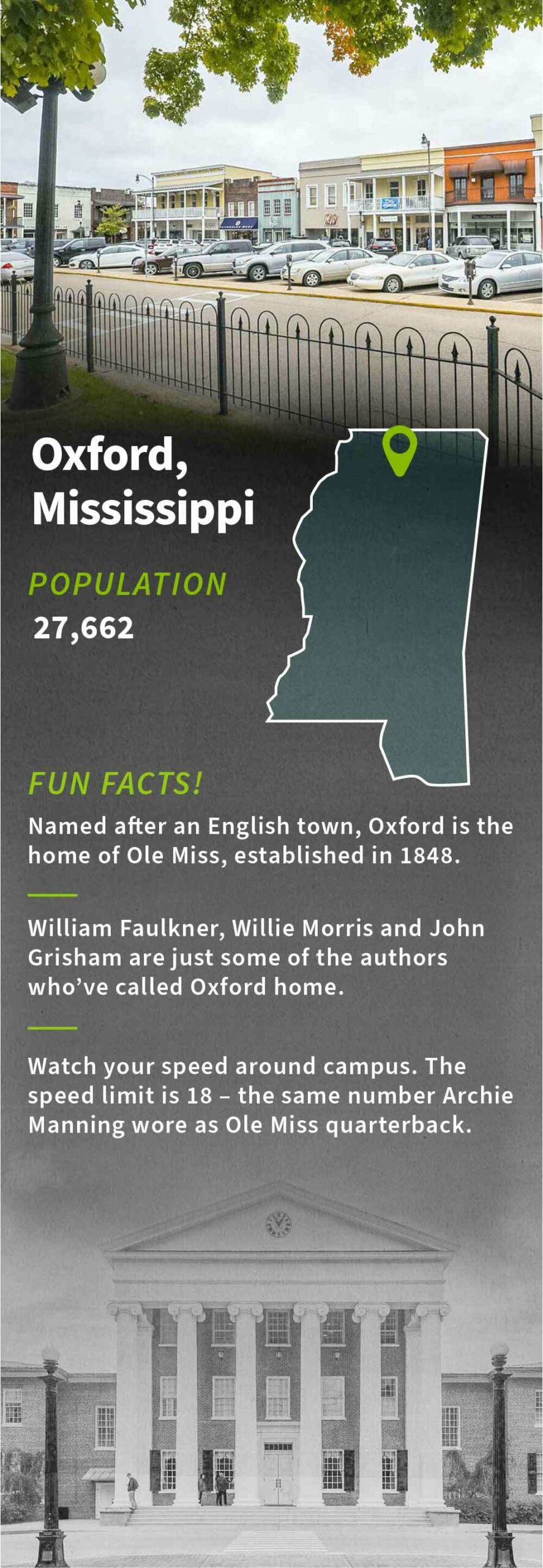EDITOR’S NOTE: We first visited Oxford a couple of years ago, just before the pandemic hit. Now we revisit this previously unpublished Good Town. Join us on our latest adventure.
Southern food writer John T. Edge is multitasking — he’s explaining what he loves about living in Oxford, Mississippi, while simultaneously doing what he loves about living in this quaint college town. He’s walking from his home office to Square Books in the historic downtown square for Tanya Amyx Berry’s signing of her photography book, “For the Hog Killing 1979.” Afterwards, he will stroll past the Lafayette County Courthouse to City Grocery and enjoy dinner with friends.
“That’s the kind of one-two punch of Oxford that I love,” he says. “The literary life of this town and the food life of this town are interwoven.”
Edge has published several books about Southern food, won three James Beard Foundation awards for his writing, and is the host of the television show “TrueSouth” featuring various “tastemakers” across the region. And, he calls Oxford home.
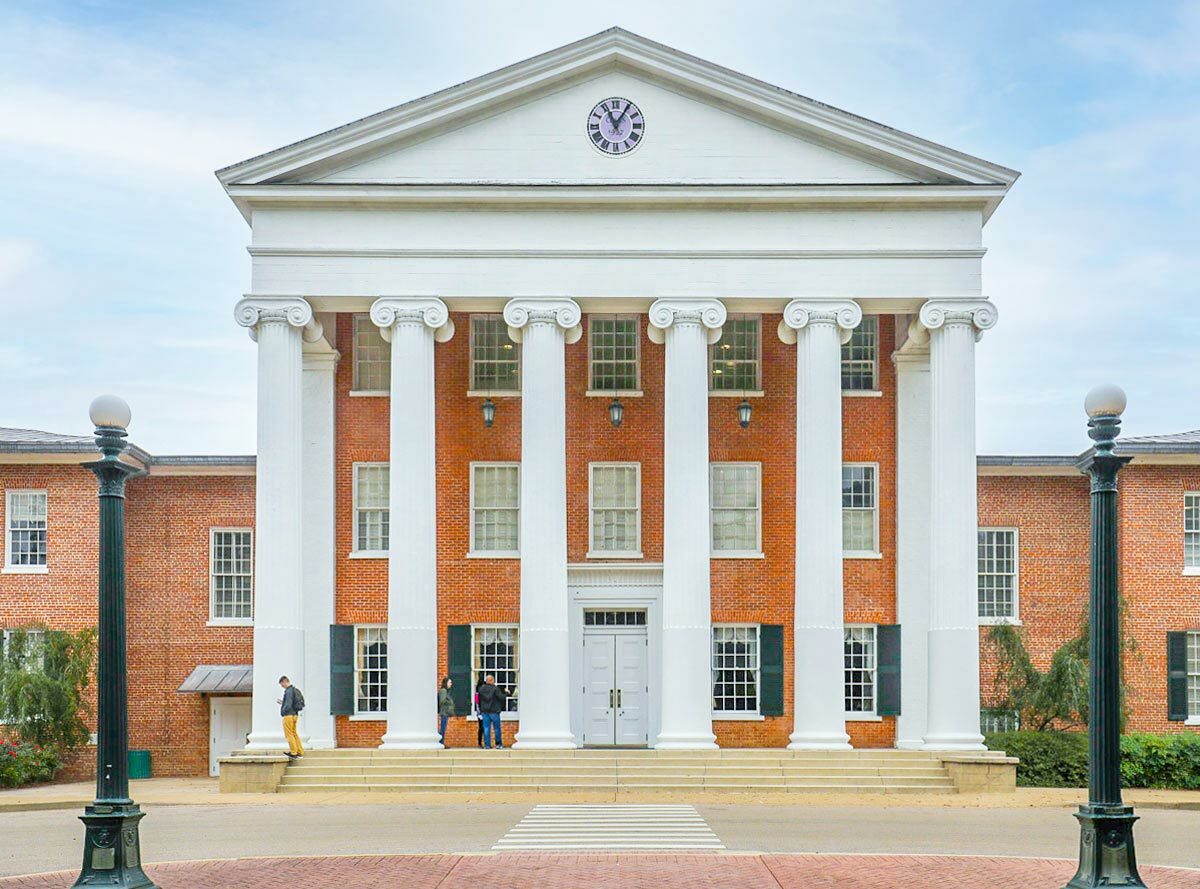
Lyceum is an Ole Miss landmark. / GARY TRAMONTINA PHOTOS

The Lyceum opened the same year the University of Mississippi did, in 1848.

The entrance to Vaught-Hemingway Stadium, which lures more than 60,000 people every football Saturday the Rebels play.

The Manning Athletics Performance Center opened in 2004.

One of the most beautiful campuses in the nation, Ole Miss is home to more than 20,000 students.

The Ole Miss branding is seen throughout the pastoral campus.

The Archie Manning statue, honoring the All-America quarterback of yesteryear.

Another example of the Yokna Sculpture Trail, the first outdoor exhibit of its kind in North Mississippi.

The Yokna Sculpture trail features five pieces of art on the Ole Miss campus.

A visitor pauses to peruse the art at the University of Mississippi Museum.
Twenty-two years ago, he helped found the Southern Foodways Alliance, an institute of the Center for the Study of Southern Culture at the University of Mississippi, affectionately known as Ole Miss. The Alliance documents, studies, and explores the diverse food cultures of the changing American South.
At its core, Oxford is a college town. Ole Miss draws a younger crowd and off-campus student housing has generated booming growth in condominiums. Football Saturdays lure thousands to The Grove and the offseason brings sightings of Ole Miss alumni and part-time resident, former New York Giants quarterback Eli Manning.
But what makes Oxford special, Edge says, is the creative culture that has emerged in the town through a collective of academics and foodies and lovers of words. “They’re all working to express the place we live and the people we claim. And they’re complementary in the way they’re doing that,” he says. “And that’s what makes us work.”
Writing on the Wall
Acclaimed author William Faulkner once said of his hometown of Oxford, “I discovered that my own little postage stamp of native soil was worth writing about and that I would never live long enough to exhaust it.”
He transformed Lafayette County and its county seat, Oxford, into the fictional Yoknapatawpha County, which became the setting for dozens of his stories. Many of those tales were imagined here, at Rowan Oak, the primitive Greek revival house on wooded acreage just south of the downtown square. He lived here from 1931 until his death in 1962, during which he won the Nobel Prize for Literature and the Pulitzer Prize and National Book Award for his 1954 novel, “A Fable.”
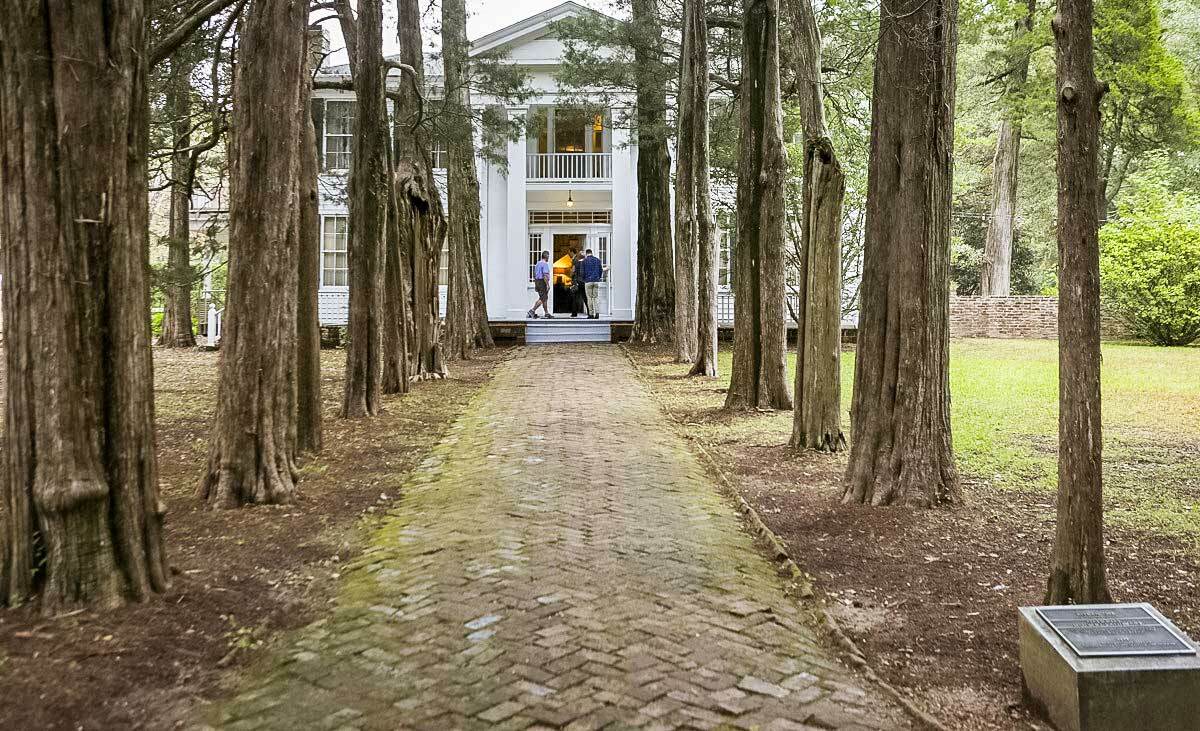
The stately entrance to Rowan Oak. / GARY TRAMONTINA PHOTOS

An external view of Rowan Oak.

William Faulkner's bedroom at Rowan Oak.

The Faulkner gravesite in Oxford.

William Faulkner spent most of his life in Oxford, writing about locals and creating masterpieces.
It’s a damp Tuesday morning and groups have already started to gather under the row of Eastern cedar trees that line the walkway to Faulkner’s home. Touring the home has become somewhat of a rite of passage for writers, readers and scholars alike who want to walk the same creaking hardwoods where such an accomplished author had paced and see the study where he handwrote the outline for “A Fable” on the wall.
Faulkner’s mark on this town is both literal and figurative. From the controversial 30-foot statue of a Confederate soldier in the downtown square, which made an appearance in Faulkner’s “The Sound and the Fury”: “They approached the square, where the Confederate soldier gazed with his empty eyes from beneath his marble hand in wind and weather;” to the home of Faulkner’s mother, Maud, which is identified by a historical marker but not open for tours; to Faulkner’s grave, marked with a roadway sign informing visitors that, “The creator of Yoknapatawpha County, whose stories about his people won him the Nobel Prize, is buried twenty steps east of this marker.” Visitors leave bottles of whiskey and pennies on his grave, a way of paying homage to Oxford’s most famous author.
For the Love of Books
There was a time when Oxford didn’t have a single bookstore. Richard Howorth and his wife, Lisa, set out to change that.
“I had the idea of opening a bookstore in my head since high school,” Howorth says, flanked by shelves covered floor-to-ceiling in colorful titles. “And the longer Oxford went without having one, the more it became a realistic idea.”
In 1979, the Howorths returned to Richard’s hometown of Oxford after learning the business while working at a bookstore in Washington, D.C. They found a small space on the second floor of an historic building in the downtown square. Square Books, they called it. To alert passersby of its existence, they built book displays at the main-level doorway. It soon developed a cult-like following.
It was an exciting time to be selling books. Oxford was in the early stages of a cultural uprising, and literature was high on the list of cool things churning out of Ole Miss’s newly established Center for the Study of Southern Culture, the first regional center in the country focused on the examination and study of the South. William “Bill” Ferris, the center’s first director, became a huge fan of Square Books, and liked the Howorths’ dream of bringing interesting authors to town. At the time, authors’ publicity tours took them to TV stations and newspapers to promote their books instead of bookstores. A strange notion, Howorth says, considering book fans tend to hang out at bookstores. Thanks to Ferris’ connections, Square Books began hosting readings and book signings by literary greats like Toni Morrison, Allen Ginsberg, Alex Haley and Alice Walker.
A few years later, when another historic two-story building on the square became available, the Howorths jumped at the opportunity to move their shop to ground level and expand their inventory. With a bona fide storefront and room to grow, Square Books did just that, adding more books and a café while continuing to host authors.
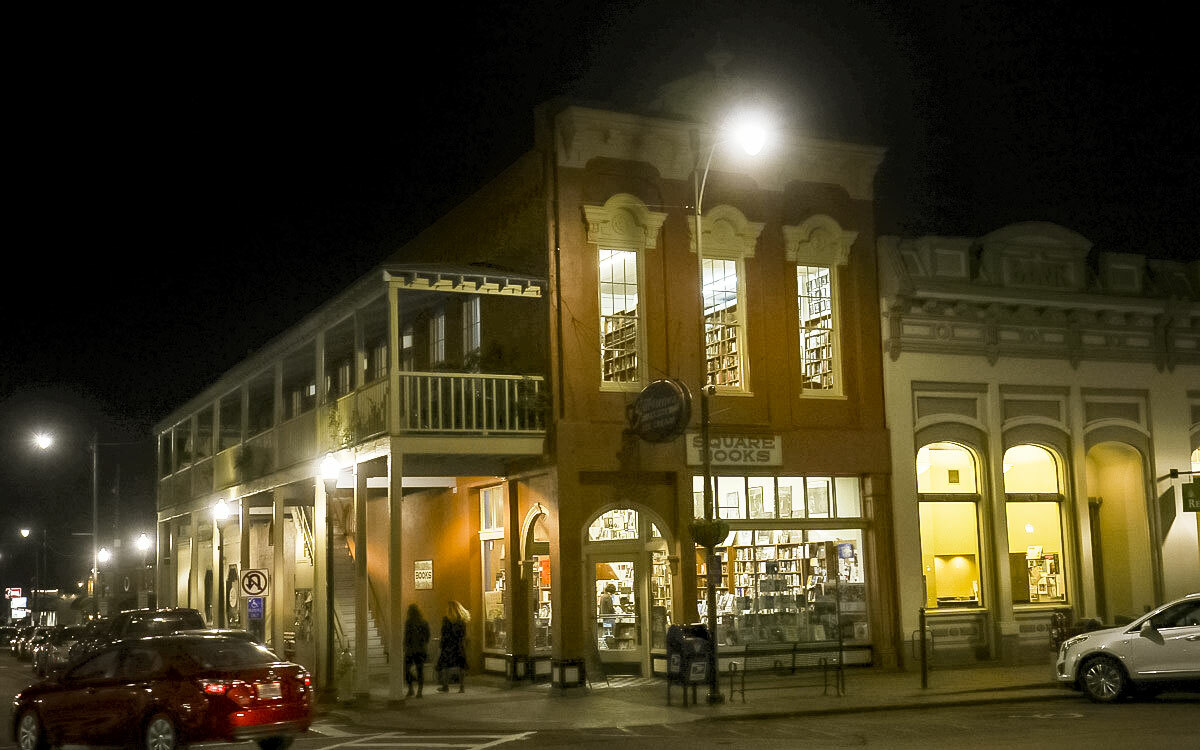
Square Books lights the night sky. / GARY TRAMONTINA PHOTOS

Richard Howorth holds court at Square Books.

This is a reader's paradise -- Square Books.

A flight of stairs at Square Books reminds readers the wonders they've yet uncovered.

A signed first edition of The Town by author William Faulkner.

A view of The Square from ground level.
In 1993, the Howorths opened Off Square Books, a lifestyle and bargain bookstore with a stage designed to hold readings and children’s events. Howorth added theater lights to shine on the stage and before long musicians started asking if they could play the venue. His answer? “Not unless it involves books or writers.”
In 2000, local author Jim Dees found a way to do just that. He launched the Thacker Mountain Radio Hour, a radio program that merged author readings with musical performances. The live radio show was recorded and broadcast from Square Books every Thursday evening during the fall and spring and rebroadcast on Saturday nights on Mississippi Public Broadcasting and Alabama Public Radio. (During the pandemic, the program moved to an outdoor venue, the Oxford Old Armory Pavilion.)
In 2003, during Howorths’ first of two terms as mayor of Oxford, the Howorths opened Square Books, Jr., a children’s book store located under the space where the original Square Books began nearly a quarter century earlier. In fall 2018, to coincide with the 40th anniversary of their family of bookstores, the Howorths turned the original Square Books location into Rare Square Books. That venue holds collectible, vintage, first edition books including first editions of some of William Faulkner’s books.
Through the years, many writers have taken up residence in Oxford, lured by Faulkner’s literary legacy and the charm of this Southern town. Among them, “A Time to Kill” author John Grisham, National Book Award nominee Barry Hannah, and Harper’s magazine editor and author Willie Morris. Square Books has remained a loyal friend to authors and readers alike, in the process earning a reputation as one of the finest bookstores in the nation, while also giving this town plenty of extra cool points.
“It’s not like Square Books invented Oxford. There were certainly other things going on,” Howorth says, humbly. “But when we opened, it all blossomed into one big hot mess.”
For the Love of Food
“There’s a little bit of magic to this place,” says John Currence, upstairs in the more casual bar area of his restaurant City Grocery in Oxford’s downtown square. Nearly 30 years ago, Currence, who cut his teeth working in some of New Orleans’ finer restaurants, visited Oxford and found himself with an opportunity to buy a former Reconstruction-era livery stable on the square.
That was 1992, when the “hot mess” of Oxford’s cultural scene was just beginning to coalesce. Currence’s plan was to get comfortable running a restaurant, then to move back home to New Orleans or perhaps New York and open something else. But before he could leave town, his restaurant became an enormous success.
City Grocery is hailed as one of the finest restaurants in Mississippi by numerous publications including The New York Times, The London Times, Food and Wine, and Southern Living. The James Beard Foundation, the authority on American dining, caught wind of Currence and nominated him for its Outstanding Chef — Southeast honor in 2005, 2007, and 2008. In 2009, he won the title of Best Chef — South.
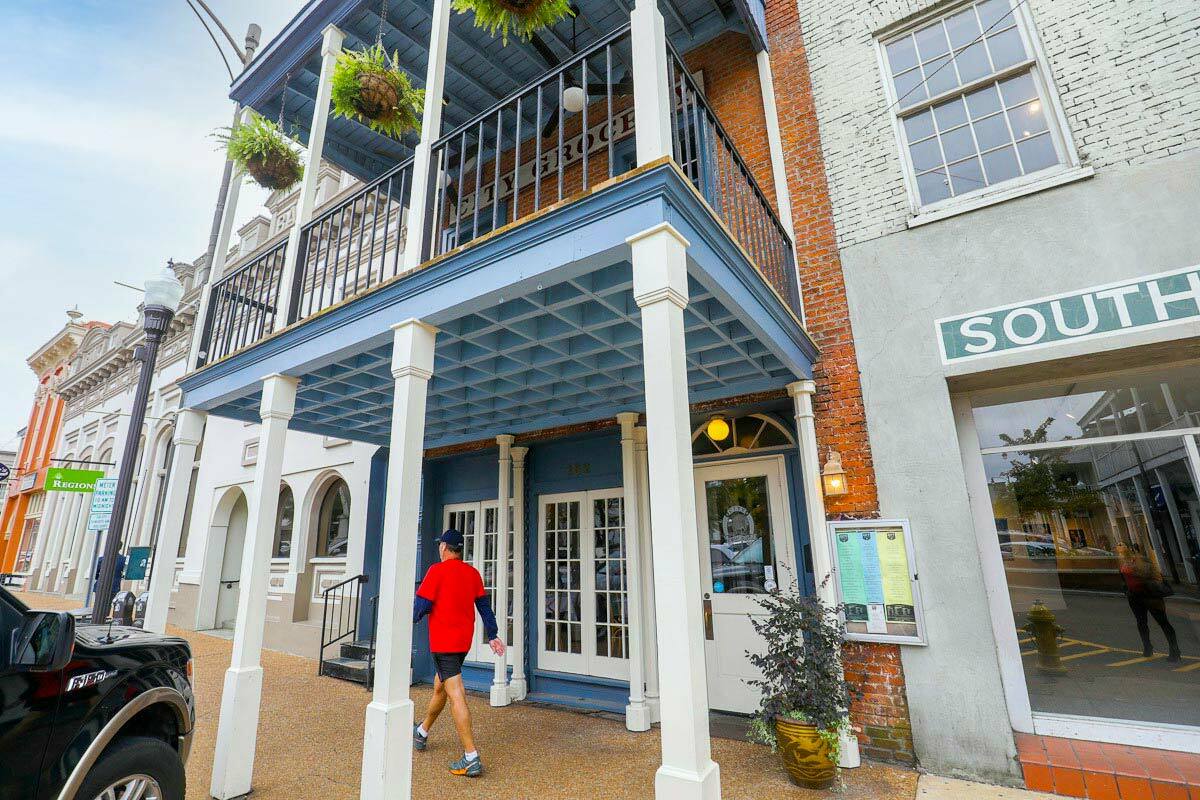
The front of City Grocery, another must-visit stop on any trip to Oxford.

John Currence takes a moment to reflect at City Grocery.

A view of The Square from the City Grocery balcony.
During that time, Currence found himself falling in love with the town and the “good people” he got to know here. “Then, I got crazy and opened something else,” he says.
Currence now owns three other restaurants in close proximity to City Grocery – Bouré, a Creole-centric “up-scale, down-home” restaurant; Big, Bad Breakfast, which has since branched out to include locations in Alabama, Florida, South Carolina, Tennessee and Kentucky; and Snackbar, a French Bistro-slash-North Mississippi Café that features “Bubba Brasserie cuisine.” In 2019, Snackbar’s chef Vishwesh Bhatt won the James Beard Award for Best Chef — South.
What Square Books is to the literary scene in Oxford, City Grocery is to the culinary arena. Since Currence opened City Grocery nearly three decades ago, the town has become chockful of wonderfully diverse restaurants, including the soul food eatery Ajax Diner and the Italian-style Saint Leo, a 2017 James Beard Best New Restaurant semifinalist and 2019 Outstanding Bar Program nominee. There’s also the Chicory Market, a community market for local farmers, and Mama Jo’s Country Cookin’, a modest down-home eatery once featured on the Travel Channel’s Bizarre Foods with Andrew Zimmern.
“There’s a little soul to this place. It’s definitely in my bones,” Currence says about Oxford, sitting below a large primitive art painting of Bo Diddley in City Grocery. He gazes past the balcony that overlooks the Courthouse Square, the chatter of afternoon traffic rising in the distance.
“I find myself thinking about moving back to New Orleans or someplace else,” he says. “But ultimately, there’s no place else I’d rather live than Oxford. It’s just a wonderfully magic little place.”
